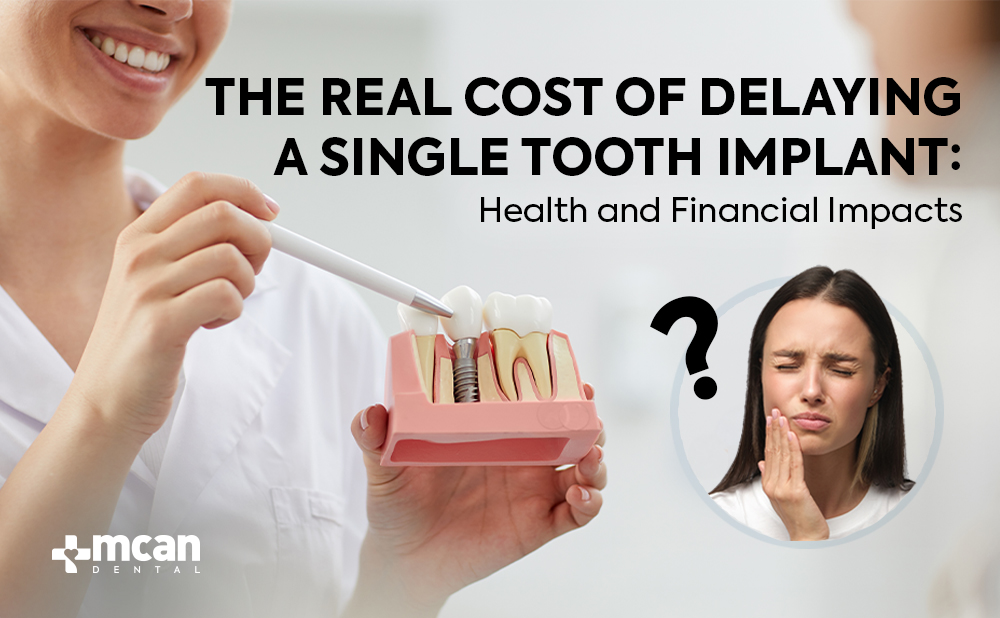
When a tooth goes missing, many people postpone replacement thinking it’s a purely cosmetic issue or something that can wait. But this delay can quietly trigger a cascade of oral health complications and increasing financial burdens. From jawbone deterioration and shifting teeth to more complex treatments and escalating costs, the impact of inaction is far greater than most realize.
This article uncovers the real cost of delaying a single tooth implant by highlighting the biological consequences of waiting and the long-term implications for your budget, oral function, and confidence. Whether you’re considering an implant now or still deciding, understanding the timeline and risks of delay can help you take proactive steps toward lasting oral health.
What Is a Single Tooth Implant?

A single tooth implant is a modern, permanent solution for replacing a missing tooth. It typically consists of:
- A titanium post, surgically inserted into the jawbone to act as the tooth root
- An abutment, which connects the post to the crown
- A custom-made crown that looks and functions like your natural tooth
Unlike bridges or dentures, a dental implant stands alone as it doesn’t rely on neighboring teeth for support. This makes it not only strong and stable, but also crucial for preserving jawbone density, maintaining facial structure, and restoring chewing and speech capabilities.
With proper care, a high-quality dental implant can last 15 to 20 years or more, making it one of the most durable and effective treatments in modern dentistry.
The Domino Effect of Delaying a Tooth Implant
Delaying a single tooth implant doesn’t just leave a visible gap. Actually, it initiates a series of oral health complications that can escalate over time. These issues may not appear immediately, but each phase of delay compounds the next, turning a relatively simple treatment into a more complex and costly process.
To help visualize the timeline of these progressive effects, here’s a breakdown of what typically happens when treatment is postponed:
| Stage | Timeline | What Happens If Left Untreated |
|---|---|---|
| Early Bone Loss | Within 3–6 months | The jawbone starts to shrink at the site of the missing tooth, reducing implant suitability. |
| Tooth Shifting | 6–12 months | Adjacent teeth begin drifting into the gap, disrupting bite alignment. |
| Opposing Tooth Issues | After 12 months | The opposing tooth may over-erupt into the empty space, affecting vertical bite and aesthetics. |
| Functional Impairment | 1–2 years | Chewing and speech efficiency decline, and TMJ stress may develop. |
| Increased Treatment Complexity | 2+ years | Bone grafting or orthodontic treatment may become necessary, increasing cost and duration. |
How Delaying a Tooth Implant Impacts Your Budget
While the health risks of postponing a dental implant are significant, the financial consequences are often what truly surprise patients. Initially, replacing a single missing tooth with an implant might seem like a major investment, but over time, the cost of delay can far exceed the original treatment expense.
Here’s how costs can escalate:
- Additional Procedures: As bone deteriorates, you may require bone grafting, sinus lifts, or even orthodontics to make space for the implant.
- More Complex Restorations: A once-straightforward single implant may evolve into a multi-unit bridge or a partial denture to address additional tooth movement or loss.
- Repeat Diagnostic and Planning Costs: Delays often mean repeating X-rays, scans, and consultations, adding to the overall expense.
- Extended Treatment Timelines: More complex cases require multiple visits and longer healing times, increasing indirect costs like time off work or travel.
Complex cases requiring full-arch restorations may shift patients toward broader solutions, such as those detailed in All on 4 Dental Implants in Turkey: A Complete Guide, which explores multi-tooth alternatives.
When Is It Too Late for a Tooth Implant?

Many patients wonder if there’s a point when getting a dental implant is no longer possible. The good news? In most cases, even with significant delay, implant treatment is still an option, though it may involve more complex procedures.
Time Sensitivity
After a tooth is lost, bone resorption begins almost immediately. Within the first 12 months, up to 25% of the bone volume in that area can be lost. As the bone deteriorates, the jaw structure weakens, making it harder to place an implant without additional intervention.
When Delay Leads to Additional Needs
If too much time has passed, you may need one or more of the following before implant placement becomes feasible:
- Bone grafting, to rebuild lost bone volume
- Sinus lifting, especially for upper molars
- Orthodontic correction, to reposition teeth that have drifted
- Treatment for gum disease or infection, if tissue health has been compromised
This kind of careful planning is especially crucial for international patients navigating treatment options abroad, something we explore in depth in A Complete Guide to Dental Tourism.
But It’s Rarely “Too Late”
Modern implantology offers advanced solutions for even the most challenging cases. With 3D imaging and guided surgery, dental specialists can often find secure implant placement points, even in areas with reduced bone density. The key is a thorough evaluation and personalized treatment planning.
Why Acting Early Saves You More Than Money
Choosing to get a dental implant as soon as possible isn’t just a financially smart move but it has far-reaching benefits that protect your health, confidence, and long-term wellbeing.
Higher Success Rates with Early Implants
When a tooth is lost, the jawbone in that area begins to shrink. Placing an implant early, before significant bone loss, allows for better anchoring, leading to higher long-term stability and fewer complications. Early intervention maximizes your chances of a successful outcome and minimizes the need for invasive procedures like bone grafting.
Preserving Your Natural Anatomy
Delaying treatment allows nearby teeth to drift or tilt into the gap. This can disrupt your bite, cause further wear on adjacent teeth, and lead to joint discomfort or headaches. Early implantation keeps your dental structure intact and balanced.
Confidence Restored, Sooner
Living with a missing tooth can affect how you eat, speak, and even smile. Getting an implant early means regaining full function and confidence without a prolonged period of discomfort or self-consciousness. Acting early also helps avoid the pitfalls of rushed or poorly planned procedures, a concern we explore further in What Are ‘Turkey Teeth’?, where we highlight the importance of informed, quality care in dental tourism.
Fewer Appointments, Faster Healing
When done timely, implant procedures are more straightforward. You’re likely to avoid the need for additional surgeries, enjoy shorter recovery times, and require fewer follow-ups. That means less time off work, fewer travel costs, and faster results.
Why Choose MCAN Dental for Your Implant Treatment in Turkey?
Delaying a single tooth implant can lead to a complex and costly period, but choosing the right clinic from the start makes all the difference. At MCAN Dental, we specialize in early, accurate, and long-lasting dental implant solutions designed to restore your oral health and confidence efficiently.
Our Istanbul-based clinic is home to expert implantologists who use advanced 3D imaging, guided surgical techniques, and top-tier implant systems to ensure precise placement and optimal outcomes. Whether you’re seeking a straightforward replacement or need corrective procedures due to delay, your treatment plan will be tailored to your anatomy, goals, and budget.


Why international patients choose MCAN Dental for implants in Turkey:
- Specialized Expertise: Our implant team brings years of experience in handling both simple and complex cases, including delayed placements and bone grafting.
- Advanced Diagnostics: We use CBCT scans and digital planning to detect even subtle issues, enabling proactive solutions before complications arise.
- All-Inclusive Packages: From airport transfers to post-op checkups, everything is arranged to give you peace of mind and no surprise costs.
- Comfort and Clarity: Our multilingual staff ensures a smooth experience from virtual consultation to recovery.
- 12-Month Aftercare: Even after you return home, you remain under our care with remote support and follow-ups.
If you’ve been considering a single tooth implant in Turkey, MCAN Dental offers a safe, streamlined path to smile restoration, with clinical excellence and comprehensive support every step of the way.
FAQs About Delaying a Single Tooth Implant
Is it ever too early to get a tooth implant?
No, as long as your jawbone is fully developed and your oral health is stable, early placement is actually preferred. It helps preserve bone and avoid complications down the line.
Can a missing tooth really affect the rest of my mouth?
Yes, neighboring teeth can shift into the gap, leading to bite misalignment and increased wear. The jawbone under the missing tooth can also start to deteriorate, affecting facial structure and oral function.
How much more expensive can it get if I delay?
Delaying can significantly increase costs due to added treatments like bone grafting, orthodontics, or sinus lifts. These extra procedures also extend the treatment timeline.
Will I always need a bone graft if I wait?
Not always, but the risk increases the longer you wait. Bone loss begins within months of tooth loss. An early assessment by an implantologist can determine if grafting is necessary.
What is the recovery difference between immediate and delayed implants?
Immediate implants often have shorter recovery times and simpler procedures. Delayed implants might require multiple stages and longer healing due to bone or gum deterioration.
